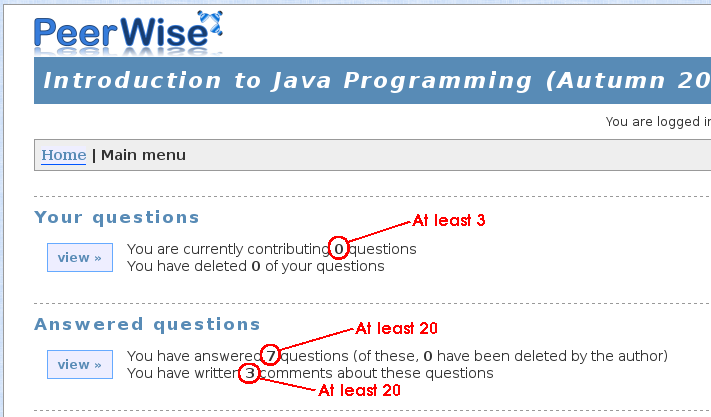Introduction to Java Programming 2010–2011 — PeerWise
We're asking you to use PeerWise
for IJP this year; in case you missed one of the introductory tutorials,
there is documentation
about PeerWise on its own site (including a number of tutorial
webcasts).
Over the course of the term, we're asking you to do the following:
- Publish at least three relevant questions on IJP's PeerWise
site. Questions should be related to the course content —
something about Java, or Objects First with Java, or even perhaps the
assignments!
- Answer at least twenty questions.
- Provide feedback on at least twenty questions (you should write at
least twenty comments, as well as grading questions for quality
and difficulty).
A genuine effort here will get full marks, irrespective of how your
submissions are rated by others.
The two deadlines, set just before the IJP multi-choice question
(MCQ) tests, are there to encourage you to create a good resource to
help everyone revise and prepare for the tests.
You can tell when you've reached your targets by looking at your main
IJP page on PeerWise:

We hope to include some of your best questions in the MCQ tests.
Writing questions
The PeerWise site's Guide for
Students contains some guidelines for question-writing. Here are a
few more tips, from a talk by Paul Denny, PeerWise's author:
- Don't rush your question — writing a good MCQ is difficult.
The more time you put into creating it, the more you will learn from it
and the more useful other students are likely to find it.
- When choosing a topic for a MCQ, try to find something you were
confused about at first, and make a note of what you were confused
about. Your misconceptions can be used to generate excellent incorrect
choices (also called “distracters”) for your MCQs.
- Avoid spelling and grammar mistakes. People often think such
mistakes are made on purpose to confuse people, even when the mistakes
are accidental.
- Avoid trick questions. Try not to write questions where it is
unclear what you are testing. Rather than trying to hide the correct
answer behind a trick, ask a question that really determines whether or
not someone understands an important concept.
- Writing the distracters is probably the hardest part. Your
distracters should be plausible and not easily dismissed as incorrect or
illogical. This makes answering the question by process-of-elimination
more difficult. You want to test people on what they know, not their
ability to simply recognise an incorrect answer.
- Don't forget to write a clear explanation as to why the correct
answer is correct, and also why the incorrect answers are
incorrect. These questions are a great opportunity for learning,
but only if you provide some guidance about the correct answer.
- You should “tag” your questions appropriately. Below
are some example tags to give you some ideas:
- To help readers identify questions related to the chapter in
Objects First with Java that they're revising, tag with chapters, for
example “chapter 1”.
- To help readers identify questions on specific topics, tag with
topic names, for example “object diagrams”.
- You may wish to tag your questions with associated course
learning outcomes, for example “principles of OO”,
“documentation”, etc.
Providing feedback
Here is some of Paul's advice on providing feedback. You should look
specifically for (and leave feedback about):
- Questions that are unclear. Occasionally this is due to the
grammar, but it may also reflect a complex topic. This problem may show
up in the question, in the alternative choices, the answer explanation,
or any combination of these.
- Sometimes there will be more than one right answer — or no
right answer. It's occasionally due to a problem in the writing of the
choices, but it's sometimes because the question was too complicated.
- Sometimes the question is too easy. The alternatives might be
unrealistic and too easy to eliminate.
- When you make suggestions, try to be specific. For example you
might suggest that the question be worded in a different way and provide
that alternate wording, or you might suggest that one of the choices be
replaced with something that makes the question more challenging.
- Be constructive and polite. If possible, point out what was good
about the question first, and then make suggestions.
Version 1.8, 2010/11/18 16:42:50
